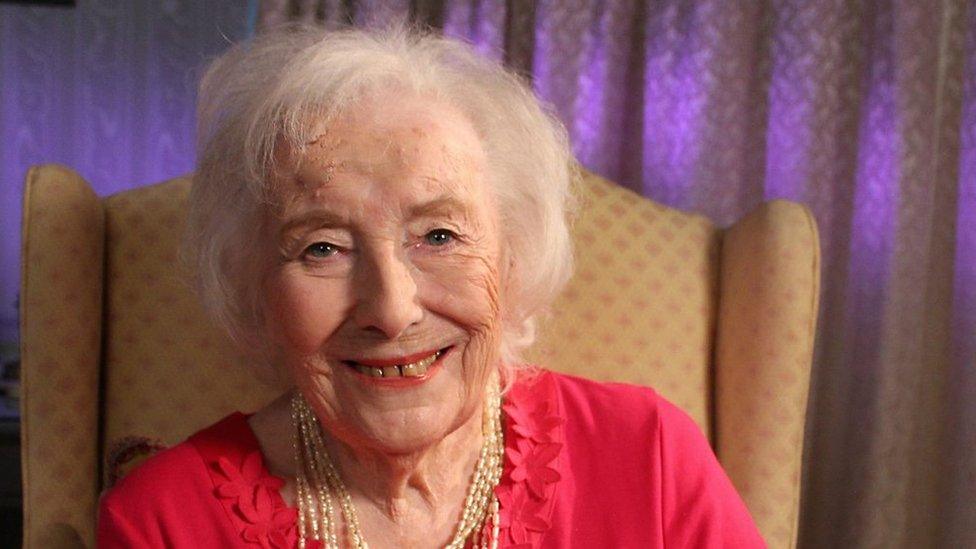VE Day: UK marking 75th anniversary of end of WW2 in Europe
- Published
Silence falls around the country as people honour servicemen and women
Extracts of Winston Churchill's VE Day speech have been broadcast to the nation, as part of the commemorations for the 75th anniversary.
Britain's wartime leader spoke about a "brief period of rejoicing" amid "toils and efforts" in the replayed speech.
Earlier, the Prince of Wales and the Duchess of Cornwall led a two-minute silence, and later the Queen will address a nation still in lockdown.
Boris Johnson expressed "eternal" gratitude to the wartime generation.
Victory in Europe Day marks the day in 1945 when Britain and its allies accepted the unconditional surrender of Nazi Germany, bringing the war in Europe to an end.
This year's celebration is limited as the lockdown prompted by the coronavirus pandemic means there will be no large-scale street parties or parades.
But at 15:00 BST, the same time that Winston Churchill addressed the nation on 8 May 1945, BBC One broadcast his words: "We may allow ourselves a brief period of rejoicing, but let us not forget for a moment the toils and efforts that lie ahead."
The commemorations began with a flypast over London by the Royal Air Force display team the Red Arrows, while RAF Typhoon jets flew over Cardiff, Edinburgh and Belfast.
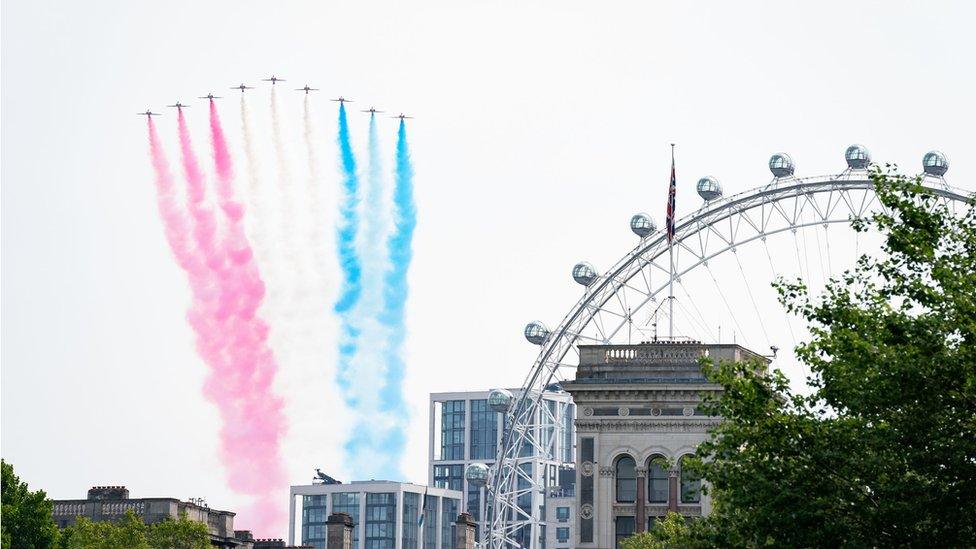
The Red Arrows left their trademark red, white and blue trails as they soared over London
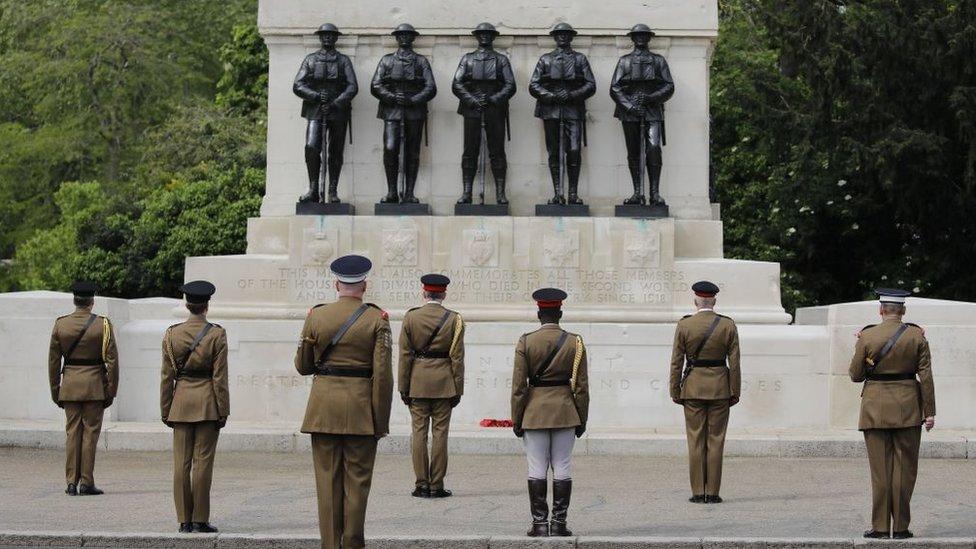
Officers and soldiers of the Household Division maintained social distancing as they laid a wreath
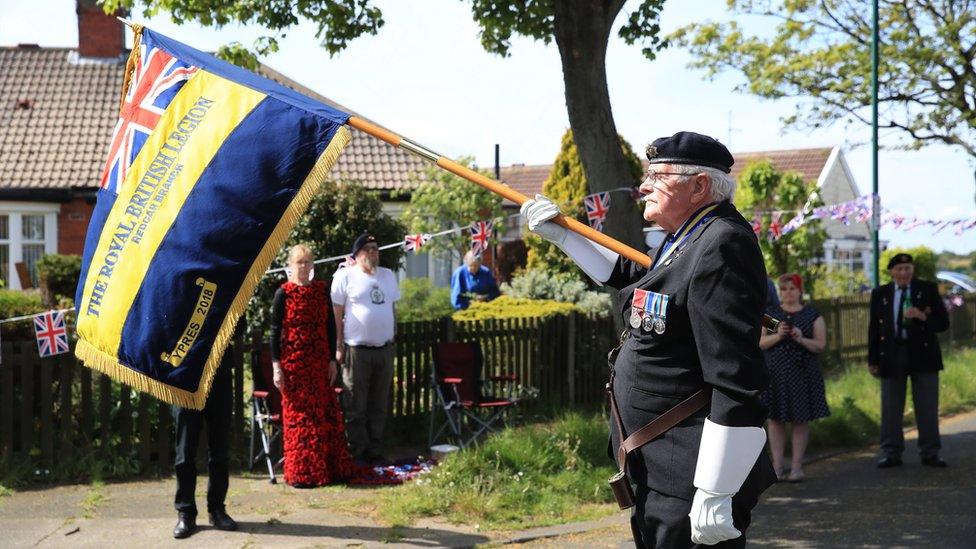
A Royal British Legion standard bearer as people mark the silence in Redcar, North Yorkshire
Then, a piper played at the war memorial near Balmoral, where Prince Charles and Camilla laid flowers and led the country in silent remembrance.
Left at the memorial with Camilla's bouquet was a message paying tribute to her father, Major Bruce Shand - who served with the 12th Royal Lancers during the war - and his regiment "who fought so bravely to give us peace".
A gun salute from Edinburgh Castle marked the beginning and end of the silence, but crowds were absent from many war memorials as people reflected at home.
Later, although large street parties were out of the question, some still managed to get out the bunting for a socially distanced celebration.
The Red Arrows fly over London
'One supreme effort'
In a message, Mr Johnson referred to the virus outbreak, saying it "demands the same spirit of national endeavour" as shown during wartime.
"We can't hold the parades and street celebrations we enjoyed in the past, but all of us who were born since 1945 are acutely conscious that we owe everything we most value to the generation who won the Second World War," he said.
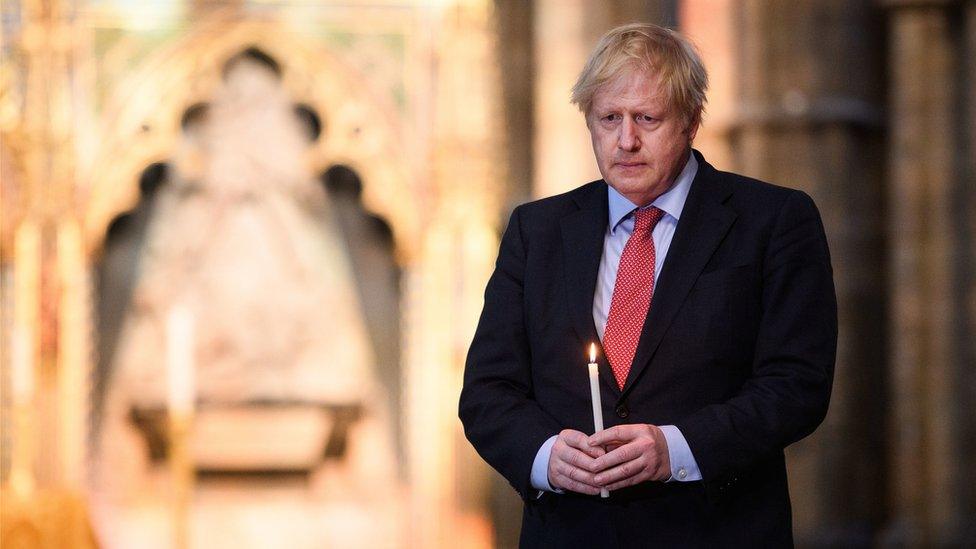
Mr Johnson lit a candle in Westminster Abbey, ahead of the day of commemorations
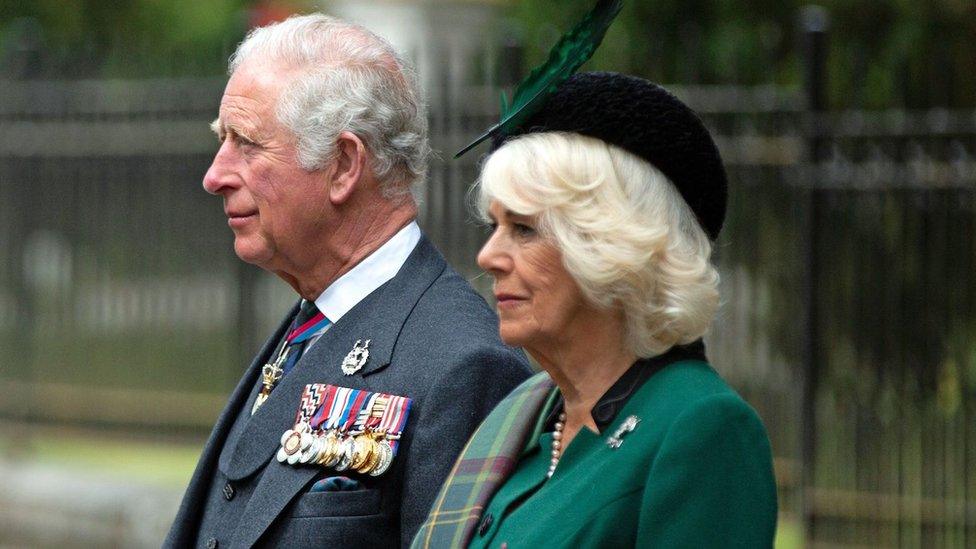
The Prince of Wales and the Duchess of Cornwall led the two-minute silence at a memorial near Balmoral
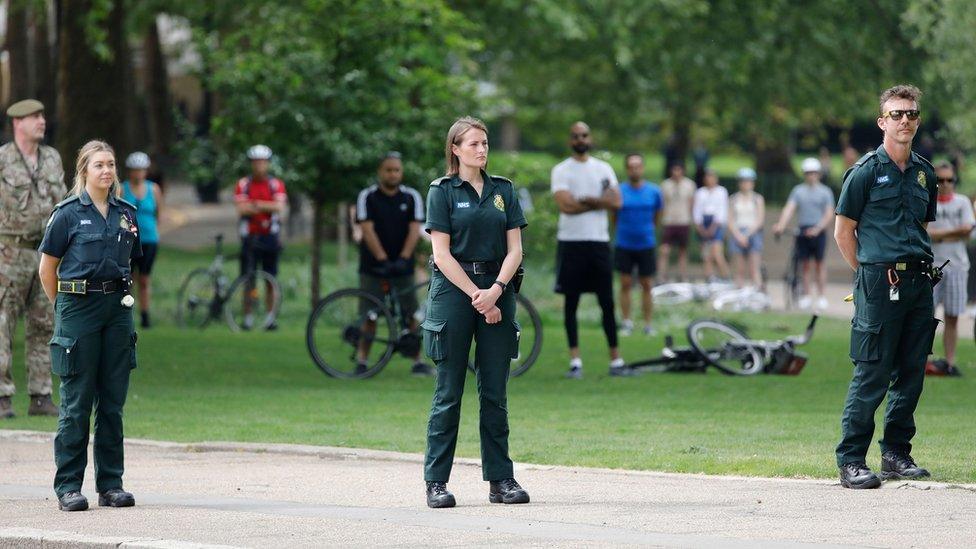
Emergency workers stopped to pay tribute at St James' Park, central London

How VE Day is being commemorated
10:50 BST: A service in Westminster sees Commons Speaker Sir Lindsay Hoyle lay a wreath on behalf of the House of Commons. Lord West laid a wreath on behalf of the Lords
11:00: A national moment of remembrance and a two-minute silence
14:45: In a special programme on BBC One, extracts from Churchill's victory speech to the nation announcing the end of the war in Europe is broadcast
14:55: Solo buglers, trumpeters and cornet players were invited to play the Last Post from their homes
15:00: As Churchill's speech was broadcast, people were invited to stand up and raise a glass in a national toast, saying: "To those who gave so much, we thank you"
20:00: Another BBC One special will feature Welsh soprano Katherine Jenkins, actor Adrian Lester and singer Beverley Knight, who will be performing some well-known songs from the 1930s and 40s. The programme will culminate in the nation being invited to sing along to a rendition of wartime classic We'll Meet Again
21:00: The Queen's pre-recorded address will be broadcast on BBC One. It will be her second televised message during the coronavirus outbreak after a rare speech to the nation last month
21:30: Spotlights will light up the sky in Portsmouth to recall the experience of blackouts during the war. The local council says the lights are also to remind people "that lighter times will come again"

'Awesome' veteran
Mr Johnson said: "We survived and eventually triumphed thanks to the heroism of countless ordinary people, who may be elderly today, but who once carried the fate of freedom itself on their shoulders.
"Across the world, our soldiers, sailors and airmen fought the Nazis with courage, ingenuity and stubborn endurance.
"On the home front, women defended our cities against air raids, worked the factories, ran the hospitals and broke enemy codes. People of every age, race and background came together in one supreme effort."
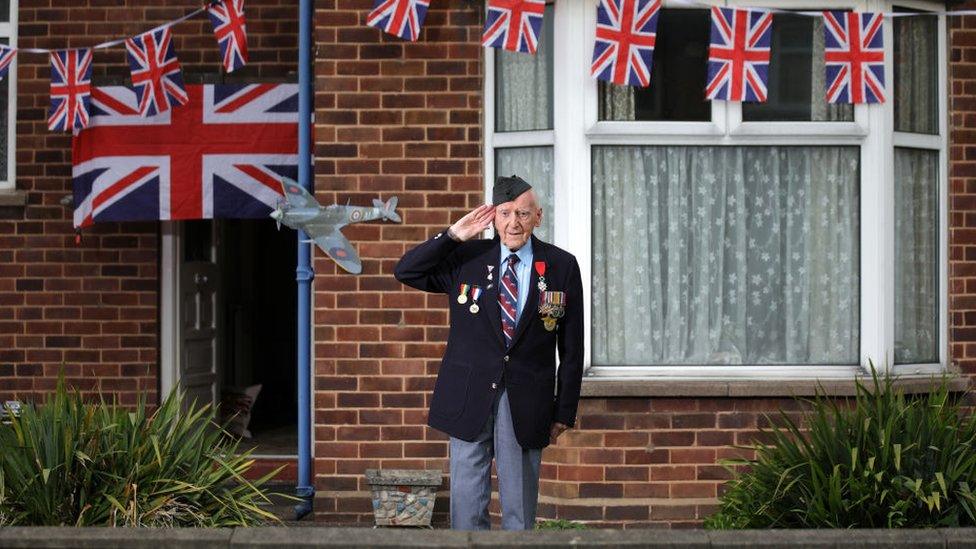
World War Two veteran Bernard Morgan, 96, stood outside his home for the two-minute silence
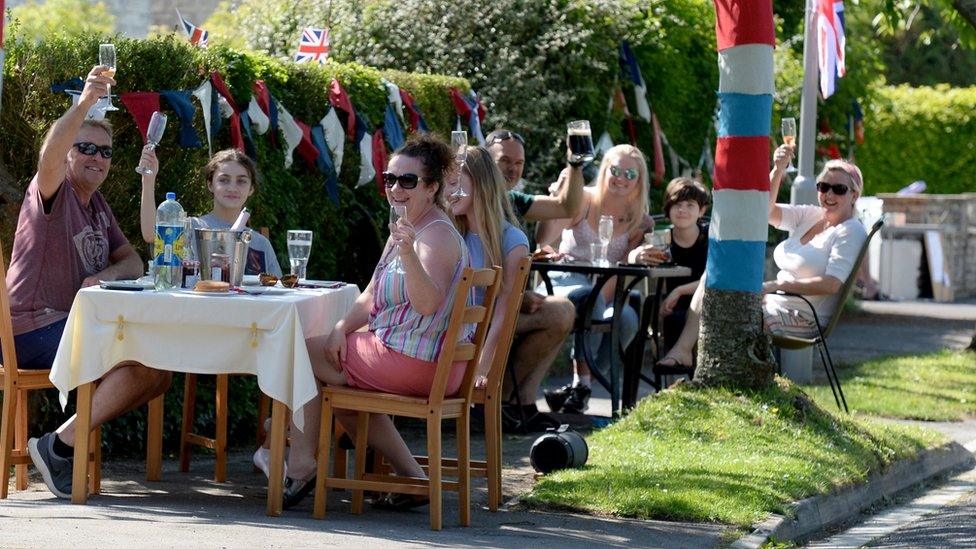
In Dorchester, these neighbours celebrated together - from a safe distance
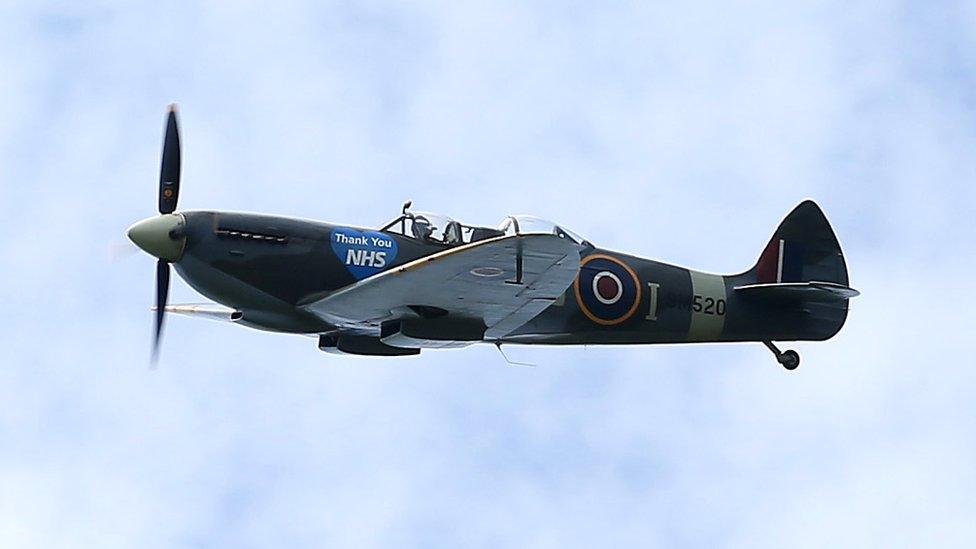
A Spitfire bearing the message "Thank You NHS" flew over the Blind Veterans UK centre in Brighton
Mr Johnson also held a Zoom call with 102-year-old WW2 veteran Ernie Horsfall, one of the UK's oldest surviving servicemen.
During the call, the prime minister told him he was "awesome" and a "credit to his generation", his official spokesman said.

What is VE Day?
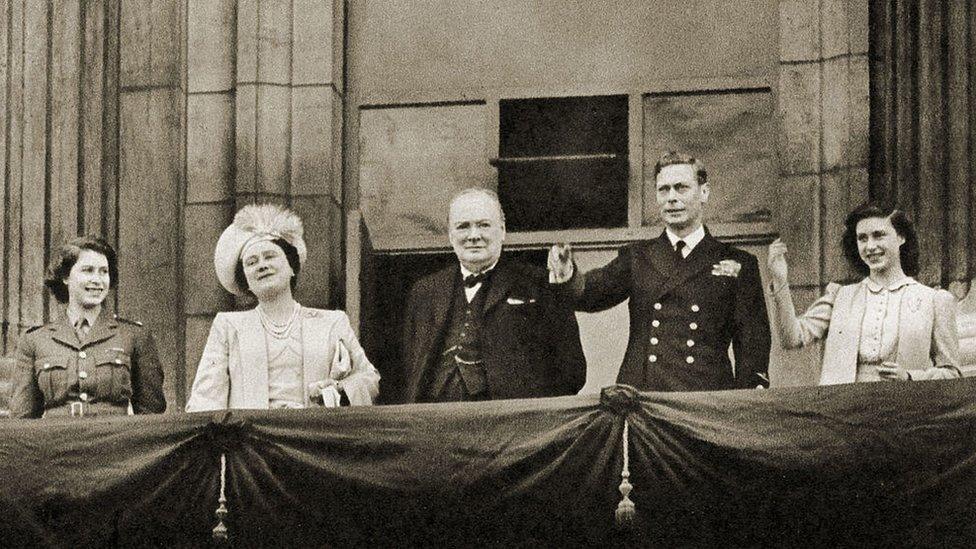
Prime Minister Winston Churchill stands on the balcony of Buckingham Palace alongside the Royal Family (with the Queen, then Princess Elizabeth, on the left) on 8 May 1945
Victory in Europe (VE) Day on 8 May 1945 saw Britain and its Allies formally accept Nazi Germany's unconditional surrender after almost six years of war.
At 15:00, Prime Minister Winston Churchill announced on the radio that the war in Europe had come to an end, following Germany's surrender the day before.
Spontaneous celebrations broke out across the country and the Queen, then Princess Elizabeth, and her sister Princess Margaret, ventured out with a group of friends to experience the excitement in London.
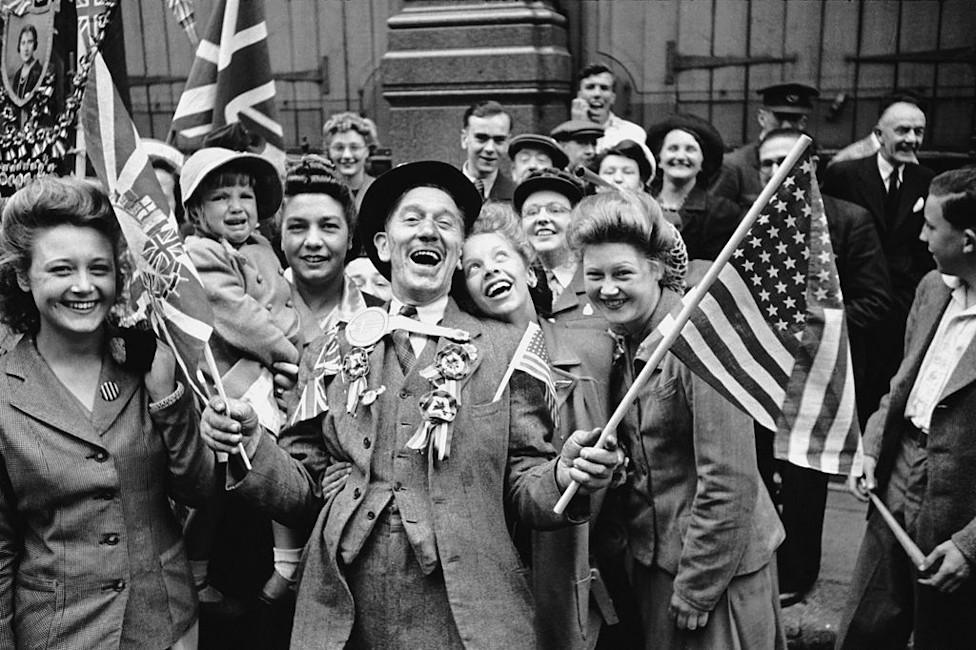
In London's Piccadilly, the end of the war was celebrated with jubilance

Writing in the Daily Telegraph,, external Labour leader Sir Keir Starmer said although people cannot be together this VE Day, "we can still remember together".
He also referred to the virus outbreak, saying: "We owe so much to the generation of VE Day. We must do everything we can to care for and support them through the current crisis."
He added: "The crisis in our care homes has gone on for too long and we must do everything we can to protect our most vulnerable, many of whom protected our country in its darkest hour."
In a video message, Archbishop of Canterbury Justin Welby said reconciliation and hope were the "two great tributes we can pay to the 1945 generation".
'That's your father'
Peter Stevens, pictured front centre aged five, saw his father, left, for the first time at the end of the war
Victory in Europe marked the point where some families could be reunited after a long separation. Born in December 1939, Peter Stevens had no memory of his father, who had been fighting in North Africa and Italy for most of Peter's life.
Peter told BBC Radio 5 Live about meeting his father for the first time, aged five: "A face came at the back window, I looked up and my grandparents said, 'That's your father.' That's remained with me all my life, that moment."
He recalls walking with his father through the fields near High Wycombe, meeting his mother where she was working and walking back together, a family for the first time in five years.
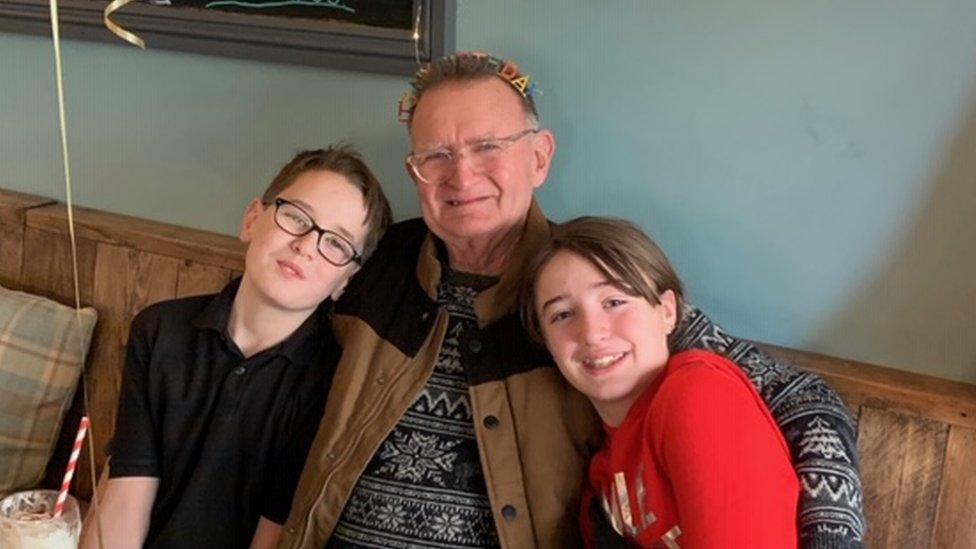
Peter Stevens pictured on his 80th birthday with his grandchildren
Message from the Queen
The BBC is airing a series of special programmes to mark the milestone, including the re-broadcast of parts of then-prime minister Sir Winston Churchill's victory speech.
A special evening programme will feature Welsh soprano Katherine Jenkins, actor Adrian Lester and singer Beverley Knight, who will be performing some well-known songs from the 1930s and 40s.
It will culminate in a public sing along of Dame Vera Lynn's We'll Meet Again, a song synonymous with World War Two.
Last month, the Queen echoed the words of the now 103-year-old singer - known as the Forces' sweetheart - when she told those in lockdown "we will meet again" during a rare speech to the nation.
A pre-recorded message from the Queen will be broadcast on BBC One at 21:00 - the exact moment her father, King George VI, gave a radio address 75 years ago.
- Published7 May 2020
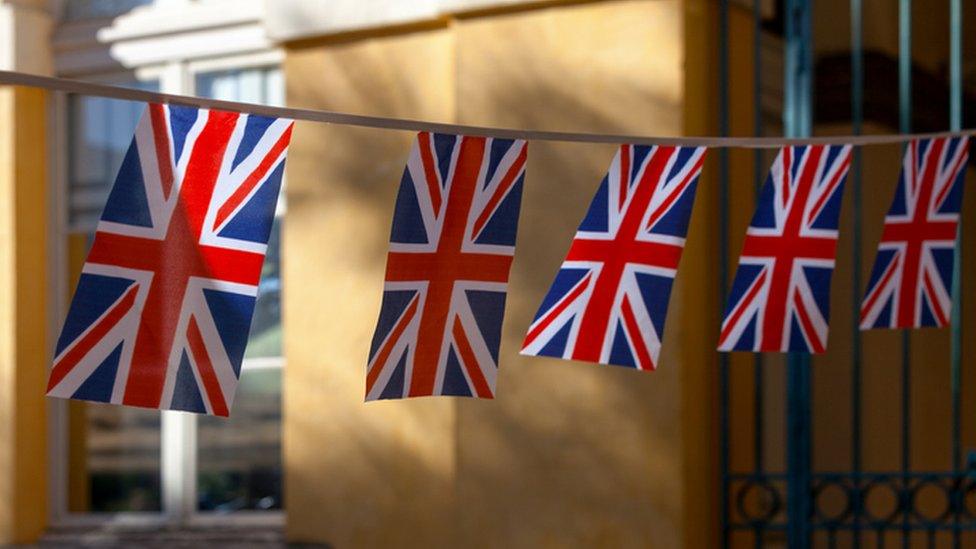
- Published7 May 2020
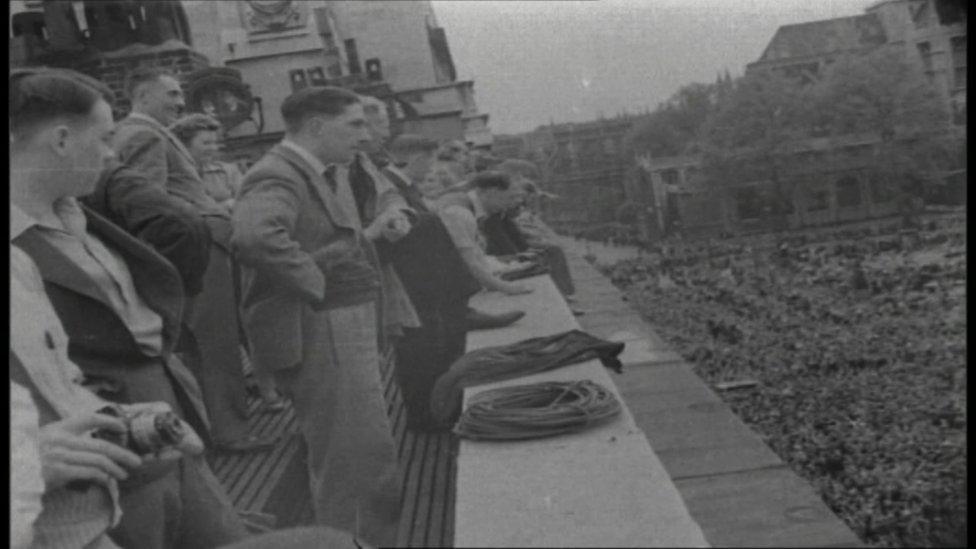
- Published7 May 2020
